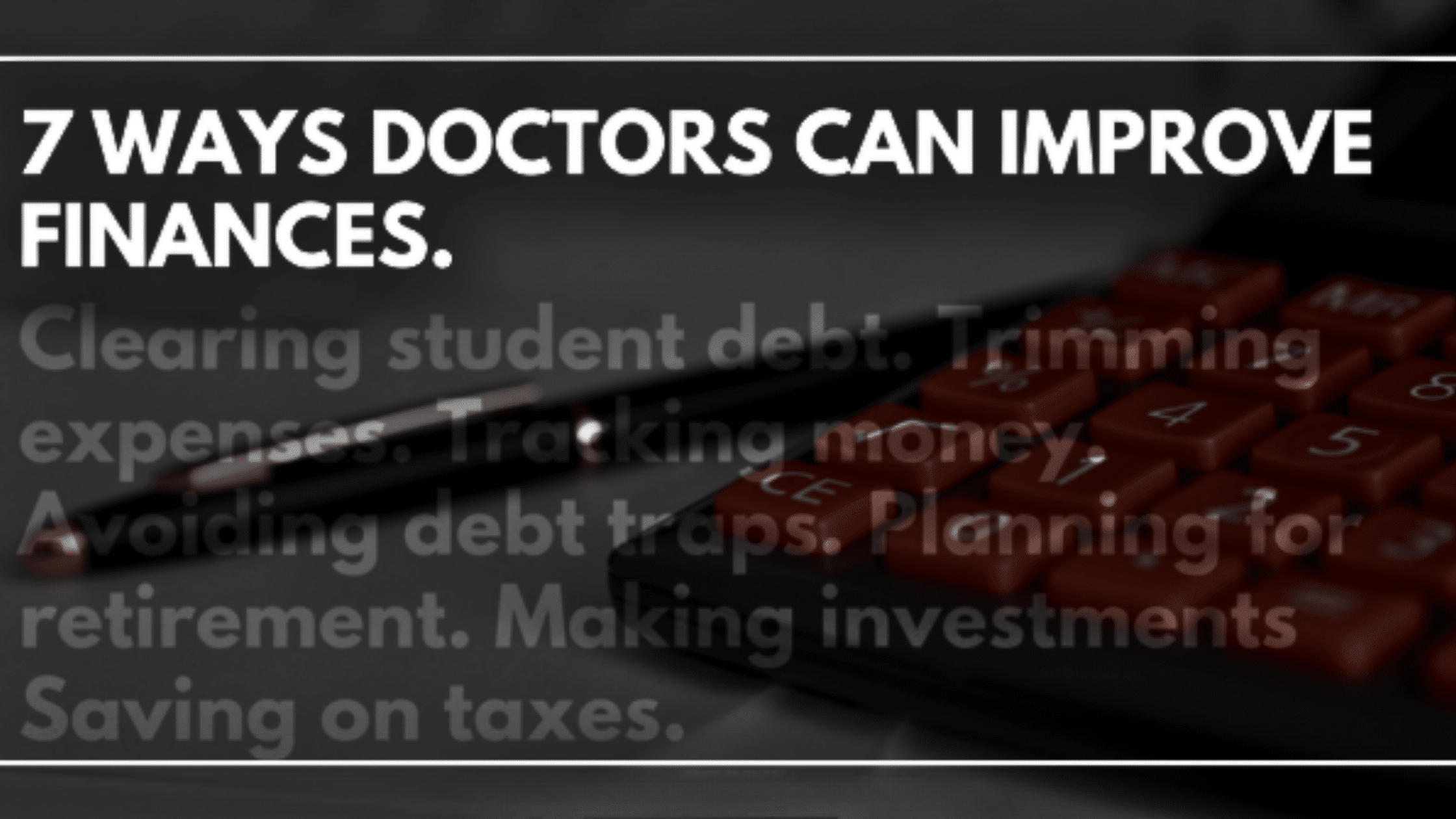For some doctors, saving lives may be easier than saving money. Doctors must hit the workforce at full speed. Following years of medical school, many doctors don’t start their careers until after 30. While friends from high school have a decade head start on earning, saving, and investing, doctors are just beginning. Saddled with student debt, many doctors immediately step into fast-paced careers with great salaries. Living fast with enough income for support, it’s easy for money-management to take a back seat. The trouble is, making more money doesn’t necessarily mean creating more wealth. After years with their heads down in the workforce, many doctors come up for air to realize they are no closer to retirement, and no further from debt, than when they graduated medical school.
Finances can be difficult for anyone to navigate. Regardless of career, many people get stuck trying to sort out retirement, investments, debt, and other money matters. For many people, balancing a checkbook is a truly distasteful experience. Doctors face many of the same financial challenges as everyone else, but they also face other challenges unique to their profession. Doctors must sort out their income, debt, and investments while also managing intense pressure and workloads. A tendency toward self-dependency can also prevent some doctors from seeking financial advice, either from a professional financial advisor, a friend, or a peer. From first-year residents to attending physicians, most doctors can stand to improve an aspect of their financial lives.
1. Clear Student Debt
Doctors are typically weighted with significant student debt following medical school. Gaining residency or getting monetary raises carries temptation for spending. For doctors with student debt to manage, try continuing to live like a student until student debt is clear. You may not have to go as far as eating ramen noodles every night, or biking to work in the rain, but perhaps hold off on making significant purchases until clear from college debt. Clearing debt can help towards creating the financial freedom for accomplishing much more.
2. Limit Lifestyle Expenses
Debt free or not, many doctors can gain from curbing their lifestyle expenses. Unnecessary lifestyle expenses can range from purchasing a new car or home, or simply eating meals out a little too often. Lifestyle expenses are different for everyone. Memberships, vacations, and accessories can get devour incomes of any size. Prioritizing investing overspending can help turn income into wealth. Can’t part with your annual vacation? Try scaling it back to save on costs.
3. Track Income and Expenses
Tracking personal expenses is something many people would rather avoid. For some, this can be from a fear of discovering their expenses and lifestyle exceed their income. Others may simply be indifferent, as their salaries are (or at least seem to be) high enough to cover whatever may come. Track your money. Tracking monthly expenses can help uncover many interesting and creative ways for saving money and can help in creating a realistic budget for spending and saving. Investing, rather than spending, can create long-term wealth.
4. Don’t Rely on Debt (for anything)
Saving a portion of income can help avoid going into debt. Without cash reserves, many families go into debt over everything from home and auto maintenance, annual family expenses, and true family emergencies. Debt is much more a trap than a safety net. Before putting purchases on credit or taking out a loan (even against your own 401(k) or life insurance plan) ask yourself if the purchase is truly within your budget. Paying cash for purchases and emergencies helps avoid debt traps and removes interest payments.
5. Plan for Retirement Early
Creating a retirement plan will help determine the shape and course of your career. A retirement plan is more than settling on a retirement date. Retirement plans create life goals and outline means for achieving them. Comprehensive retirement plans ensure there is enough money for you to enjoy your golden years. Not sure if you should spend your raise on a new watch or invest in retirement? Planning for retirement is the first step toward leaving the workforce on your terms. How soon until that’s possible is going to be up to you.
6. Make Informed Investments
Spending money buys things, investing money creates wealth. Doctors typically enjoy high salaries allowing increased opportunities for saving, spending, and investing. The market is ruthless; making investments requires knowledge of the market and constant attention. Doctors often have the means to make diverse and interesting investments, yet like anyone else, doctors remain susceptible to losses. Before making an investment, contact a financial advisor and determine the best investment strategy for you.
7. Take Advantage of Tax Deductions
Doctors tend to earn more, potentially placing them in a higher tax bracket then they’ve ever been in. Higher tax brackets mean increased obligations to pay. Tax-smart investments (such as Roth and Traditional IRAs, and 401(k)s) may allow for contributions to be deducted from the taxable income amount. Reducing the taxable income amount can help place doctors in lower tax brackets, reducing annual obligations to pay. Ask your financial advisor about the different tax-savvy investments for maximizing tax deductions.
Do more with your money. Find out how best to manage money towards creating and maintaining the future you want. Speak to a financial professional at High Bluff Private Wealth for more ways to invest in your future. For more on saving, retirement, and tax-savvy investing call High Bluff Private Wealth at (858) 792-7027 or visit www.OverlandShanahan.com .
The opinions voiced in this material are for general information only and are not intended to provide specific advice or recommendations for any individual.
[/vc_column_text][/vc_column][/vc_row]




